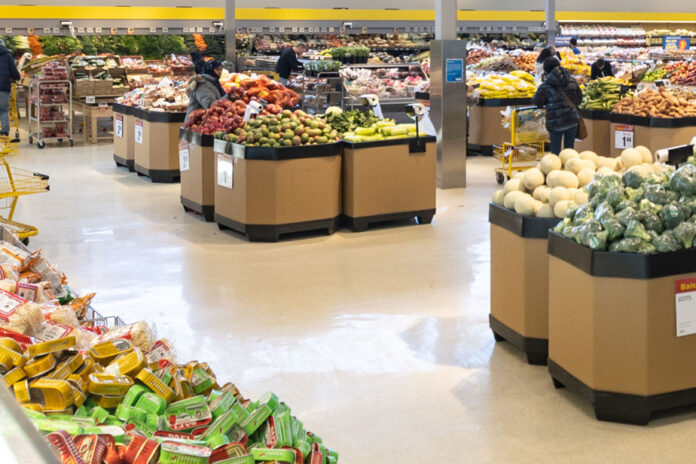(Ottawa) Sales at Canadian retailers rose slightly in July, fueled by sales at supermarkets and grocery stores, but Statistics Canada said Friday that its first estimates for August pointed to a decline.
According to the federal agency, retail sales advanced 0.3% to 66.1 billion in July, while those of food retailers climbed 1.3% for the month.
Katherine Judge, senior economist at CIBC, said the increase in spending at grocery stores could be a sign that households have chosen to eat out less, due to rising interest rates and prices.
“This casts doubt on the idea that services consumption can offset weak goods consumption at the start of the third quarter,” she observed.
Statistics Canada said its first estimates for August suggested a 0.3% drop in retail sales for that month — but warned that this figure would necessarily be revised before its official release, a month from now .
Ms Judge added that the August preliminary reading could have been affected by the wildfires.
“But even accounting for a rebound in September, real retail sales appear to be down 2.5% to 3.5% annualized in the third quarter. A second consecutive quarter of weakness suggests that consumer spending will be weak in the gross domestic product (GDP) figures for the third quarter. »
Furthermore, while the Bank of Canada will have to assess how much of the decline in retail trade was attributable to strikes at BC ports and wildfires, this is consistent with the idea that the economy is weak enough to that the central bank keeps its rates unchanged, Ms. Judge stressed.
Retail sales increased in seven of nine subsectors in July, and spending was more widespread than the previous month.
Core retail sales—which exclude gas stations and fuel dealers and motor vehicle and parts dealers—increased 1.3% in July.
Sales at general merchandise retailers increased 1.8%.
The biggest decline was seen at auto vehicle and parts dealers, whose sales fell 1.6%—their first decline in four months. Sales at new car dealers fell 1.7% and those at used car dealers fell 3.1%. Retailers of automotive parts, tires and accessories saw sales increase 1.0%.
Ms Judge noted that these results followed a series of significant gains for car dealers. Supply chains have normalized, allowing the industry to catch up with pent-up demand.
Sales at gas stations and fuel merchants also lost 0.7%. Expressed in volume terms, they decreased by 1.0%.
Taken overall and expressed in volume terms, retail sales fell 0.2% in July, Statistics Canada said.
Overall, Judge argued, the retail report indicates that consumer strength continued to decline in the third quarter.
“We expect the unemployment rate to rise further in the future and, combined with the impact of mortgage renewals at higher interest rates, this will add pressure on consumption, which will likely convince the Bank of Canada to take a break for the rest of this year. »















